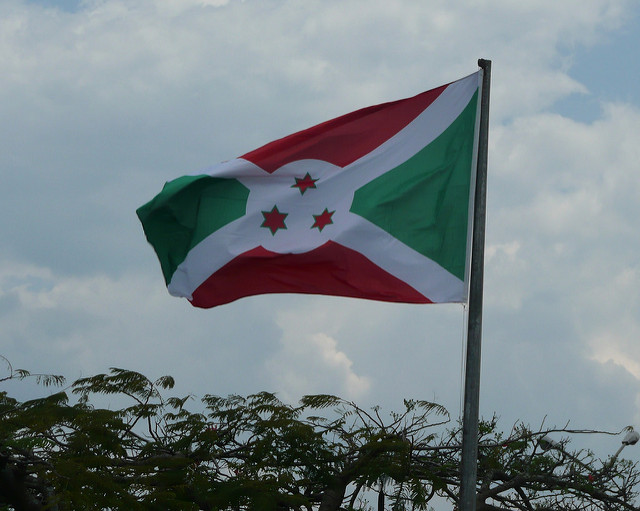News
Burundi’s government enforcers now killed for their silence

Despite her family’s ties to Burundi’s ruling party, she no longer feels safe in a country where security forces are routinely accused of torturing and killing perceived opponents. (Photo by Seeds of Hope/Flickr, CC BY 2.0)
KIGALI, Rwanda — Vanessa Kaneza is on the run, hiding from security agents she believes killed her husband and may want to harm her.
Despite her family’s ties to Burundi’s ruling party, she no longer feels safe in a country where security forces are routinely accused of torturing and killing perceived opponents. Now, as the InternationalCriminal Court begins looking into the alleged crimes, she and others fear the security forces have begun eliminating their own allies, like her husband, to ensure silence.
“I prayed for my husband daily to stop participating in hunting down people, but I didn’t have power over him,” Kaneza told The Associated Press. “I know he is already dead and I blame the president for this.”
Her husband, a retired soldier named Aime Manirakiza, had been a member of the Imbonerakure youth group, which helped break up protests in 2015 over President Pierre Nkurunziza’s bid to seek a disputed third term that he ultimately won.
Manirakiza had been active in Musaga, a neighbourhood in the capital, Bujumbura, where Imbonerakure members were seen shooting into civilian crowds at the peak of the protests.
The 40-year-old disappeared in May. Kaneza, who later fled to neighbouring Rwanda, said she was told that her husband was eliminated by his Imbonerakure colleagues acting on orders from “high up.”
Local human rights activists have been documenting similar cases of witnesses of abuses who were killed or disappeared since the East African nation descended into the violence that has left hundreds dead and forced hundreds of thousands to flee into neighbouring countries.
Imbonerakure members who are thought to have witnessed grave crimes are now at risk of being assassinated or arrested, said Pierre-Claver Mbonimpa, Burundi’s most prominent human rights activist.
The ICC this month said judges have authorized an investigation into allegations of state-sponsored crimes in Burundi, including murder, rape and torture, committed since April 26, 2015. The ICC said it can investigate actions that occurred before Burundi’s withdrawal from the Hague-based court took effect last month.
The reports of missing witnesses signal that “despite the government’s rhetoric that it will resist any attempt by the ICC to investigate alleged crimes, it may also be concerned about having people being able to corroborate Imbonerakure’s alleged participation in such crimes alongside security and intelligence officers,” said Yolande Bouka, an independent analyst now based in the United States.
A prominent local activist has published a list online of dozens of Burundians “forcibly disappeared” over the past two years. It includes Imbonerakure members, activists and politicians from various parties, journalists, intelligence agents, police and army officers and civilians.
Some security agents who participated in alleged crimes have been eliminated as violently as their victims, said Pacifique Nininahazwe, who runs the website and has been sharing information with ICC investigators.
Nininahazwe cited at least three Imbonerakure members he said were eliminated this year: Cedric Kwizera, Audifax Ndayizeye and Ligan Harerimana. He is also aware of Manirakiza’s disappearance.
The activists documenting the killings of Imbonerakure members feel some sympathy for them, saying the state is simply using them. The youth group members commit crimes following orders from above, the activists say, so they are victims too.
Burundi’s government did not respond to requests for comment. Officials have denied charges by a United Nations commission of inquiry and human rights groups of extrajudicial killings, calling the allegations part of a propaganda campaign by activists seeking to discredit the government.
Nkurunziza rose to power in 2005 following the signing of the Arusha accords to end Burundi’s 13-year civil war that killed about 300,000 people. Some Imbonerakure members fought alongside him as child soldiers, and many are in their 30s now.
Nkurunziza was re-elected unopposed in 2010 after the opposition boycotted the vote. He said he was eligible for a third term in 2015 because lawmakers, not the people, had chosen him for his first term, but critics called the move unconstitutional.
Under growing international pressure, Nkurunziza’s government now is trying to pass legislation that would extend his rule beyond 2020, when his current term expires.
Despite relative calm that has settled in many parts of Burundi, sporadic violence persists, often perpetrated by the security forces and allied groups such as the Imbonerakure.
Shortly before he disappeared in May, Manirakiza told his wife that his relationship with his bosses in the intelligence services had soured, but gave no details.
Kaneza said government officials never helped her search for her husband’s body.
She said one of his colleagues shouted when she went asking: “If you don’t keep your mouth shut, you know what the consequences will be.”





















